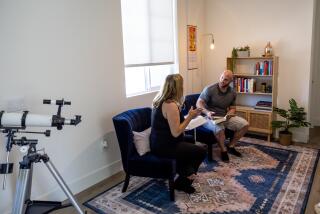Solo performances
- Share via
A woman’s place is in the home, traditionalists proclaimed four decades ago, amid much protest from feminists. Today, a woman’s place is her home, and she is more likely than ever before to own it.
Women have arrived.
Whether single, divorced or widowed, they are purchasing homes in record numbers, thanks to low interest rates, increased earning power and a desire to make a sound investment, according to several studies.
Single women are now the second-largest segment of the home-buying market, according to the National Assn. of Realtors. In 2003, they accounted for 21% of home purchases, trailing married couples -- who made up 59% of the market -- but well ahead of single men at 11%. However, homeownership among unmarried women with children lags far behind their wealthier male counterparts.
Because many women are earning higher salaries than ever before, the barriers to buying a home without a husband have all but disappeared, housing experts say. Additionally, low interest rates are allowing even the most wary buyers to get into their first homes, with an eye toward moving up if and when they find a life partner.
“Before, women dreamt that they’d meet a man who would buy them a house,” said Teresa Sotelo, a divorced media executive who owns a home in Alhambra. “Get over it! Women today are having kids on their own; they’re not waiting for Prince Charming anymore.”
Alwyn Wright surely isn’t. Worried that she was about to be priced out of a Southern California home, the single 30-year-old classical violinist bought a two-bedroom Encino condo in a complex with a gym, swimming pool and secure underground parking for $318,000 in May, after two years of contemplating such a purchase.
The musician, formerly a student at USC’s Thornton School of Music, travels outside the country three or four times a year for concerts and often keeps late hours when performing with regional orchestras, including the Los Angeles Master Chorale and Long Beach Symphony orchestras.
Her condo unit, one of scores in the sprawling complex, was the perfect choice for a woman on her own, she said. There is company around when she wants it, and she appreciates the low-maintenance lifestyle.
Wright chose a zero-down option -- she’d saved a fair amount toward a down payment but decided to hang on to the cash -- and pays about $1,800 a month for her first and second mortgages, plus $200 for monthly homeowner association fees. After sleepless nights agitating about going it alone, she now is satisfied with her decision to take the plunge.
“Am I worried? Yes, it’s scary,” Wright said. “But I also found the experience empowering. The old stigma about women buying a home on her own is being replaced with a new sense of independence.”
Wright’s condo purchase is fairly typical of single women buying today, said Janet Kemmerer, a Centex Homes spokeswoman. They tend to buy attached units such as condos or single-family homes in high-density areas clustered close to other detached units, which share common landscaping.
“The traditional family is changing,” Kemmerer said. “We’re seeing a number of single people buying. We also see unrelated singles pooling their resources to buy.”
Relatives sometimes share the expense too, said Owen Delman, a Carnahan & Associates agent in Woodland Hills. He recently helped single sisters find the right-sized house in which to raise their children together. Another client, a single woman who adopted a child from China, recently moved up to a bigger house to accommodate her expanded household.
“I see a lot of single parents who need houses,” Delman said. “It’s an economic necessity.”
By 2010, the number of women-headed households with no spouse will increase to 31 million, about 28% of all households in the country, according to Fannie Mae. Since 1950, households headed by women have grown fourfold, largely due to the stepped-up divorce rate, delayed marriage decisions and a longer life expectancy for women.
Reacting to this surge of women-headed households, Fannie Mae and Freddie Mac, the nation’s largest providers of mortgage money, as well as lenders and marketing companies, are specifically targeting single and divorced women for homeownership. That makes sense since, collectively, women earn more than $1 trillion annually and influence $2.4 trillion -- 80% -- of the $3 trillion in annual consumer sales, according to the Women’s Mortgage Industry Network, an industry educational group.
“Women have a sense that buying a home is a good investment,” said Allegra Calder, a research analyst at Harvard University’s Joint Center for Housing Studies. “Many women don’t marry out of college anymore. They work longer now to save for down payments and buy later.”
Or in some cases, earlier. Julie Saunders, 26, rented a room in her father’s house for three months after college, then shared an apartment with a roommate for a year before buying a newly built, two-bedroom home with a loft in Valencia for $412,000 in July.
The physical therapist didn’t have a down payment saved, so she opted for a zero-down plan and is paying a total of about $3,000 a month for her two adjustable-rate mortgages and association fees. To help defray the monthly costs, she rents out one of the bedrooms.
Saunders said she’s undaunted by the number of married families starting to move into the neighborhood. She views the purchase as an investment in her future.
“I already have equity,” Saunders said. “Homes here are already selling for more than I paid for mine. Down the road, I can either sell my house or rent it out if I decide to move.”
Despite single women’s inroads into homeownership, roadblocks still exist. The No. 1 problem, said Tonya Jackson, vice president of customer care at Freddie Mac, is lack of information about the home-buying process. The next-biggest obstacle is credit -- women either haven’t established credit on their own or are carrying bad credit left over from a divorce.
If only Sotelo had known about taking on a husband’s debt. The entertainment-industry executive, 49, bought her Glendale dream house in 1993 for about $380,000 with her husband, whose salary was not as dependable as hers. After her husband lost his job, the couple fell behind in their payments and lost the house to foreclosure. They divorced.
For seven years, Sotelo lived in a rental in Montrose, struggling to erase the considerable bad credit accrued by her ex-husband but which she shared because the house and their credit cards were in both their names.
After getting engaged last August, Sotelo wanted to buy a house but didn’t qualify because of her still-poor credit rating. Finally, using the combination of her strong salary and her fiance’s good credit to qualify for a loan, they bought a house in Alhambra, putting both names on the property title. The couple recently called it quits, though, so Sotelo is buying out her ex-fiance’s interest in the house, and she has applied for a refinance. If approved, she will, at last, have sole title to her home.
“Sometimes these lessons are hard to learn,” Sotelo said. “Women need to embrace knowledge about credit. It’s everything when you want to buy a house.”
Jeff Masters, a real estate attorney, agrees. He advises women to split the joint debt in the divorce settlement, so that each of their credit reports reflects only half of the debt accrued as a couple. He also recommends that women clean up their credit reports before seeking a loan for a house purchase.
Women who buy homes on their own should take sole title to the property, Masters said. Those who buy with partners should delineate in writing how title passes if one partner dies or splits from the partnership. Also, women should seek larger, reputable mortgage companies to avoid the predatory practices of some smaller lenders who take advantage of widowed and divorced women in particular.
Despite the challenges involved in home buying, most women who have bought houses on their own urge others to take the risk.
“You don’t have to wait till you’re married or have someone to do it with you,” Saunders said. “It’s doable on your own. It’s a stressful process and time-consuming, but it’s worth it.”
More to Read
Inside the business of entertainment
The Wide Shot brings you news, analysis and insights on everything from streaming wars to production — and what it all means for the future.
You may occasionally receive promotional content from the Los Angeles Times.










